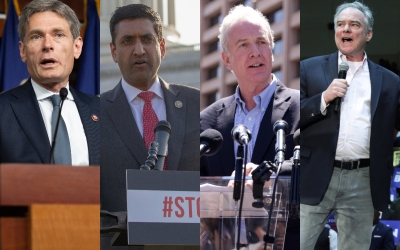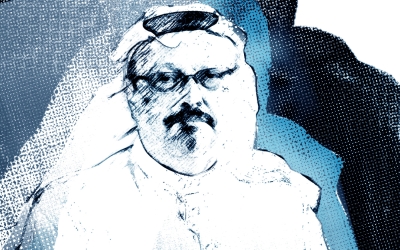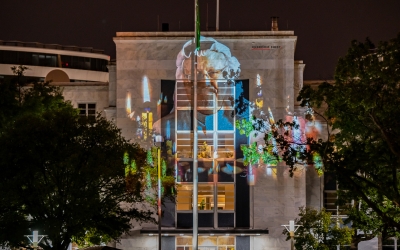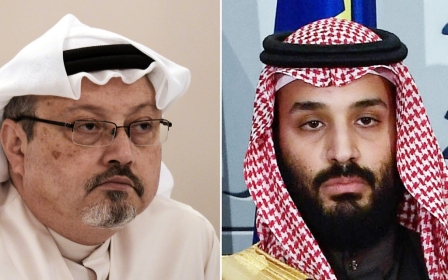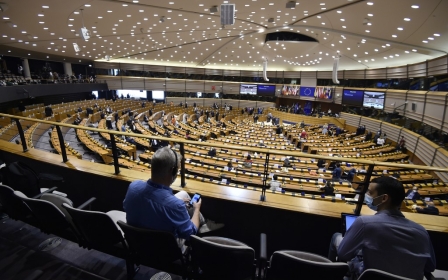What does justice for Jamal Khashoggi look like?
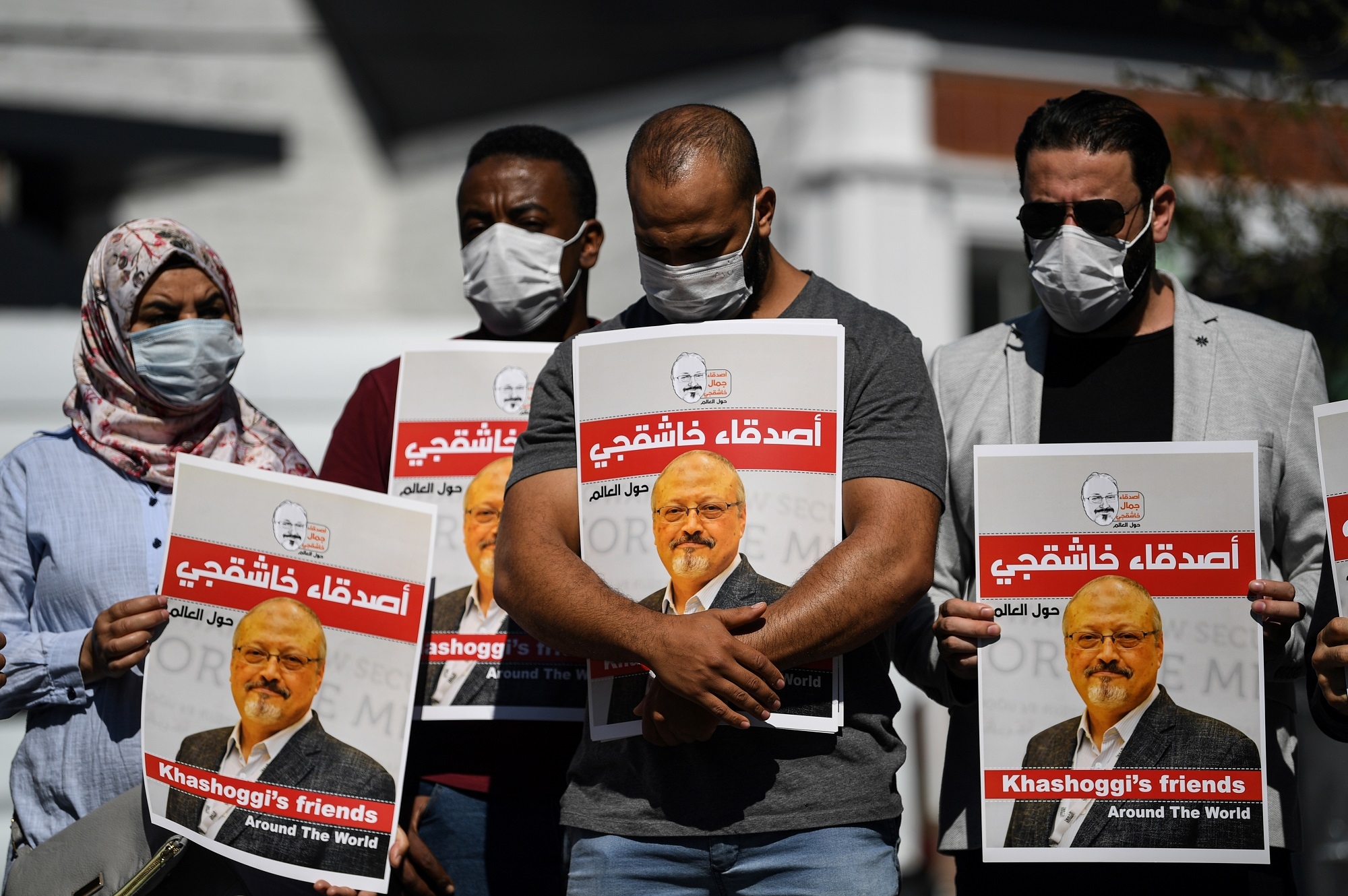
Two years after the murder of Jamal Khashoggi, justice for the slain journalist remains elusive with geopolitical interests often trumping the voices pushing for accountability from Saudi Arabia's rulers.
But what would justice for Khashoggi even look like?
Ideally, accountability for the murder would involve a fair and transparent trial where those who ordered the assassination would be brought to justice, along with the agents who carried it out, says Agnes Callamard, the UN rapporteur on extrajudicial killings.
In that improbable scenario, which would only be achieved by "extraordinary changes in Saudi Arabia", Crown Prince Mohammed bin Salman (MBS) would likely be indicted, Callamard added.
But justice seekers, she adds, "should not be held hostage" to the Saudi judicial system in their pursuit of accountability.
New MEE newsletter: Jerusalem Dispatch
Sign up to get the latest insights and analysis on Israel-Palestine, alongside Turkey Unpacked and other MEE newsletters
In a phone interview with Middle East Eye, Callamard said justice for Khashoggi can take many forms, including keeping his legacy alive and advocating for democracy and human rights in the kingdom and across the region.
Justice
Callamard said activists should continue to press for the entire truth about the assassination to be revealed, and for Khashoggi's remains to be located.
"Rendering justice for Jamal is also acknowledging the man, acknowledging his work and acknowledging his vision," she said.
"So justice for Jamal, we can also see that in the recreation of DAWN [Democracy for Arab World Now]. That was his brainchild and something that he worked towards when he was in Washington, DC. To me, that is also justice for Jamal because it means, even while he's dead, his vision is still being carried forward."
'Rendering justice for Jamal is also acknowledging the man, acknowledging his work and acknowledging his vision'
- Agnes Callamard
Khashoggi's friend and supporters on Tuesday launched DAWN, an advocacy group and think-tank envisioned by the journalist, in Washington to honour his legacy and advance the cause of democracy in the Middle East.
Callamard, whose investigation into the murder last year concluded that the assassination was an "extrajudicial killing for which state responsibility attaches", said the recent forming of a Saudi opposition party in exile may also be considered a form of justice.
Khashoggi did not identify as a dissident and may not have joined the new organisation - dubbed NAAS - but its launching demonstrates that Saudi authorities have failed to silence activists in spite of growing threats and surveillance, Callamard said.
Khashoggi, who wrote for the Washington Post and Middle East Eye, spoke out against bin Salman's crackdown on dissent, but he never called for the overthrow of the monarchy.
Trump protects MBS
The late journalist left Saudi Arabia for self-exile in Washington in 2017 because of the shrinking space for free expression, as he was banned from publishing columns in government-aligned newspapers.
He was killed and dismembered by Saudi government agents at the kingdom's consulate in Istanbul, Turkey, two years ago.
The kingdom initially insisted that he had left the building alive before conceding that he was murdered. But officials in Riyadh still claim that the assassination was a rogue operation carried out without the approval or knowledge of bin Salman.
The journalist had served as a media adviser to the Saudi embassy in Washington. Then late in 2016 when he criticised Donald Trump, Riyadh moved swiftly to distance itself from his remarks.
As president, Trump shielded the kingdom's rulers, particularly MBS, from the fallout and outrage that followed the assassination.
Weeks after the murder, the White House released a statement defending the Saudi royal family and hailing economic relations, including weapons deals, between Washington and Riyadh.
Over the past two years, Trump has also blocked congressional efforts aimed against Riyadh, vetoing resolutions to freeze weapon deals and to end US support for the Saudi-led war in Yemen.
The US administration has also ignored a legally binding congressional request to release the intelligence community's findings into the assassination.
What should Biden do?
With the presidential election looming, some Democrats hope that a Joe Biden victory in November would make accountability for the murder a more realistic prospect.
"We're going to have a new president. We're going to enact that legislation. We are going to have a relationship with Saudi Arabia that actually is consistent with what we stand for as Americans," said Congressman Tom Malinowski at an event commemorating Khashoggi on Thursday.
For her part, Callamard said a president Biden should simply "respect the democratic decisions of the American Congress". That means releasing an unclassified report about the details of the murder, ending support for the Yemen war and freezing arms deals with Saudi Arabia.
The UN expert has also been emphasising the importance of sharing the US intelligence community's findings on the assassination - a demand she made in her own report last year.
Because Khashoggi was a US resident who worked for an American publication, Callamard argues that Washington can play a decisive role in delivering accountability, starting with what she calls "truth-telling" - revealing who ordered, planned and carried out the murder.
US media reports late in 2018 revealed that the CIA found MBS was responsible for the murder - a conclusion shared by lawmakers who received classified intelligence briefings on the incident.
Moreover, analysts say such an operation could not have materialised without the crown prince's approval.
So why is it important for the US to reveal details about the murder that seem predictable?
"From an international legal standpoint and an international political standpoint, the public release of a document with the CIA assessment - a document that could be probed by others - will make it far more difficult for the rest of the world, particularly governments, to ignore Mohammed bin Salman's personal involvement in the operation that led to the killing and dismemberment of Jamal Khashoggi," Callamard said.
"It's all about making it more difficult - if not impossible - for countries, governments, the UN decision making bodies, to turn the page."
Basically, a report spelling out the names of the people who ordered the assassination would likely obliterate the kingdom's denial of the involvement of top officials, which is often cited by Trump when defending MBS.
US sanctions and Saudi trial
Despite the mounting criticism of its handling of the crisis that followed the murder, the US administration insists it is not ignoring human rights in its dealings with Riyadh, citing sanctions that it has imposed on Saudi officials in relation to the assassination.
Washington announced sanctions against 17 Saudis, including senior MBS adviser Saud al-Qahtani, late in 2018, for "having a role in the killing".
Callamard told MEE that the sanctions, which froze the individuals' assets in the US, did not go far enough.
"There was no one high enough in the government and the chain of command to make those sanctions particularly helpful, in my view, and certainly not sufficient to bring about accountability," Callamard said.
'Nobody spoke about the fact that the body of Jamal Khashoggi has yet to be found'
- Agnes Callamard
The UN expert also took issue with the fact that the sanctions came without explanation of the exact role that the targeted individuals played in the murder.
Saudi courts, which delivered their "final verdicts" in the murder case last month, exonerated Qahtani. Callamard slammed the rulings, which sentenced eight anonymous defendants to as long as 20 years in jail.
She called the Saudi trials a "miscarriage of justice".
"The Saudis attempted to move swiftly and quickly with a trial, which indicted some of the main culprits involved in the killings," Callamard said. "On the other hand, because it's in Saudi Arabia, that trial fell short of a number of conditions to be legitimate."
Among the issues cited by Callamard: Only the hitmen, not those who commissioned and organised the assassination, were indicted; the names of the defendants were not released; the prosecution treated the murder as an individual, not state, crime, and the Saudi government insisted that the killing was a domestic affair - despite its violation of several statutes of international law.
"And nobody spoke about the fact that the body of Jamal Khashoggi has yet to be found," Callamard said.
Family pardon and G20 boycott
She also criticised the Khashoggi family pardons of the defendants, five of whom had been sentenced to death.
The UN expert, who opposes the death penalty, said she was glad the sentences were commuted, although "the process whereby the commutation took place, that added to the many weaknesses, limitations and violations of that trial".
This year's anniversary of the murder comes as Saudi Arabia gears up to host world leaders at the G20 summit in Riyadh next month.
The kingdom is organising a global meeting for mayors - dubbed the Urban 20 convention - as part of the summit. Rights groups are calling on the major municipalities to boycott the event, with the mayors of London, New York, Paris and Los Angeles opting out.
Callamard said her first recommendation for invitees would be to not attend, or to condition their participation on human rights improvements, including the release of Saudi political detainees and imprisoned journalists.
Those who do attend the summit, Callamard added, should raise concerns about human rights in the kingdom. "They must use the platform to demand press freedom, to demand freedom of expression, to demand accountability for Jamal Khashoggi."
Middle East Eye delivers independent and unrivalled coverage and analysis of the Middle East, North Africa and beyond. To learn more about republishing this content and the associated fees, please fill out this form. More about MEE can be found here.


